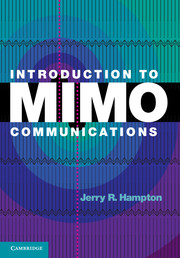Book contents
- Frontmatter
- Contents
- Preface
- 1 Overview of MIMO communications
- 2 The MIMO capacity formula
- 3 Applications of the MIMO capacity formula
- 4 RF propagation
- 5 MIMO channel models
- 6 Alamouti coding
- 7 Space-time coding
- 8 Spatial multiplexing
- 9 Broadband MIMO
- 10 Channel estimation
- 11 Practical MIMO examples
- Appendices
- References
- Index
5 - MIMO channel models
Published online by Cambridge University Press: 05 December 2013
- Frontmatter
- Contents
- Preface
- 1 Overview of MIMO communications
- 2 The MIMO capacity formula
- 3 Applications of the MIMO capacity formula
- 4 RF propagation
- 5 MIMO channel models
- 6 Alamouti coding
- 7 Space-time coding
- 8 Spatial multiplexing
- 9 Broadband MIMO
- 10 Channel estimation
- 11 Practical MIMO examples
- Appendices
- References
- Index
Summary
A common assumption in MIMO analyses is that the channel matrix consists of independent identically distributed complex Gaussian gains (i.e., H = Hw). In the real world, however, this is not always the case. In particular, correlation between the received or emitted signals to or from antenna pairs, or the existence of a direct LOS component in the signal at each receive antenna causes H ≠ Hw. In this chapter, we introduce several analytical models for H that incorporate the effects of antenna correlation and the impact of LOS propagation. These models often appear in the MIMO literature and provide a convenient means to compute the impact of antenna correlation and Rician fading (as opposed to pure Rayleigh fading) on the capacity of a MIMO system.
MIMO channels in LOS geometry
We begin this chapter by considering the case where the transmit and receive antenna arrays are within line-of-sight of each other and there is no scattering in the channel, as illustrated in Figure 5.1. Under this assumption, we seek a mathematical expression for H and a criterion that assures a high MIMO capacity, despite the fact that scattering is normally assumed to be required to support spatial multiplexing.
Information
- Type
- Chapter
- Information
- Introduction to MIMO Communications , pp. 97 - 113Publisher: Cambridge University PressPrint publication year: 2013
